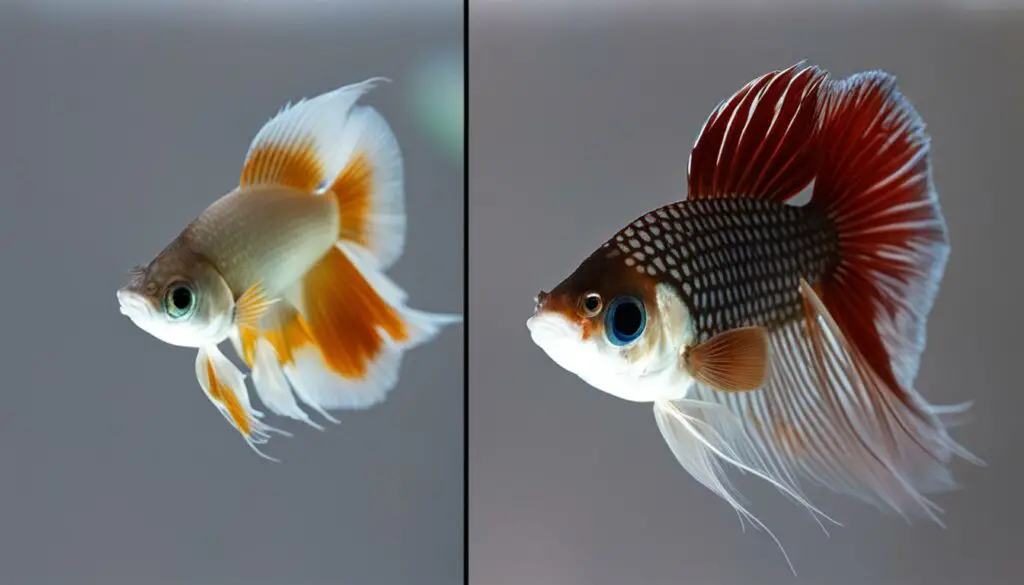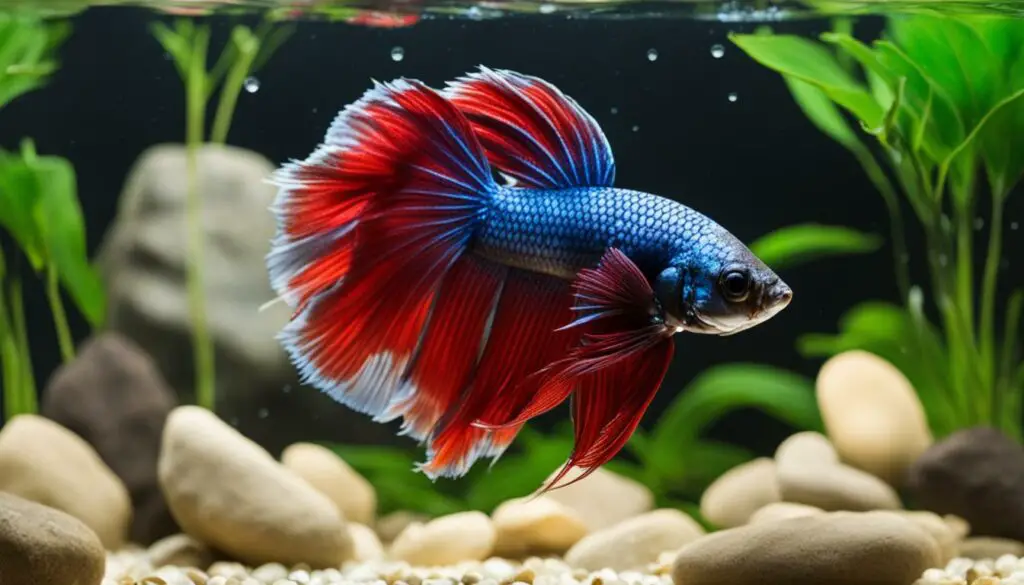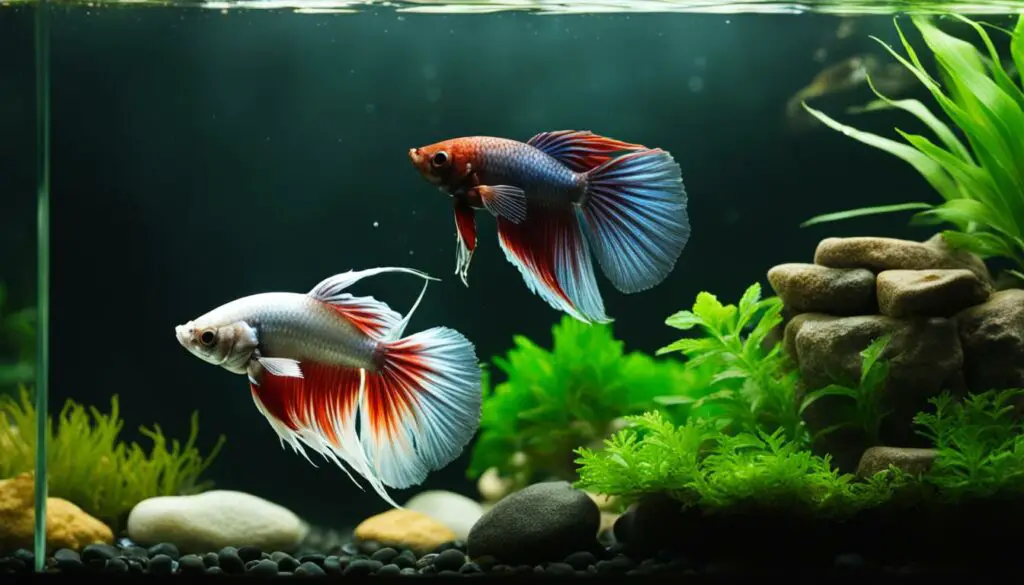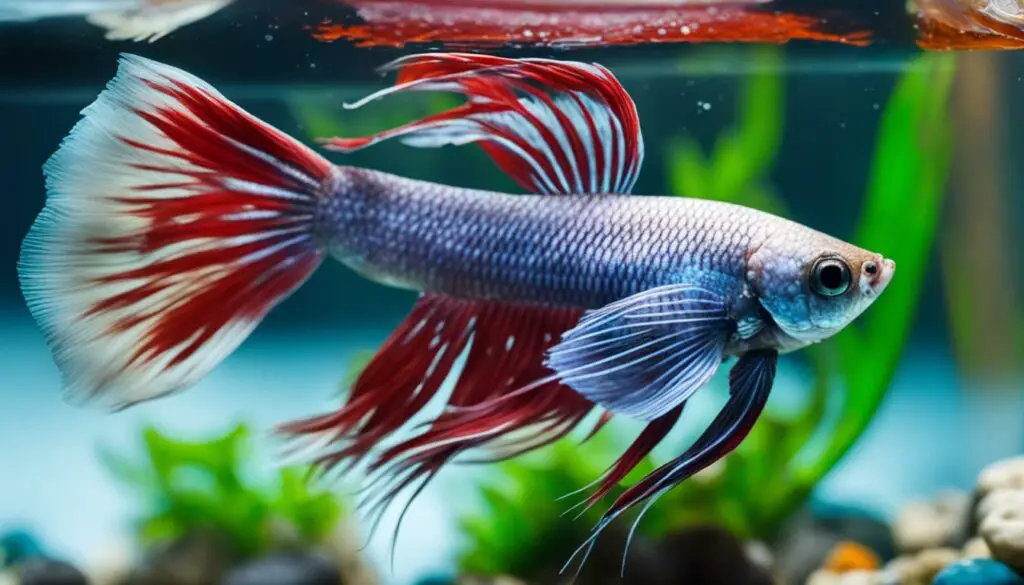Last Updated on 2 years by admin
Betta fish are a popular pet choice for many, but just like any other living creature, they can experience health issues from time to time. One common problem that betta fish owners may encounter is cloudy eye.
Cloudy eye in betta fish can be caused by a variety of factors, including poor water quality, bacterial infections, and injuries. It can be a painful and uncomfortable condition for your fish, so it’s important to take prompt action to treat it.
In this comprehensive guide, we will explore various treatment options and offer simple solutions for betta fish owners. By following the guidelines provided, you can help your fish recover from cloudy eye and maintain their overall health.
Key Takeaways:
- Cloudy eye in betta fish can be caused by poor water quality, bacterial infections, and injuries.
- Prompt action is necessary to treat cloudy eye and alleviate pain and discomfort in your fish.
- This guide provides comprehensive information on various treatment options available for betta fish owners.
- Preventive measures like maintaining a clean and healthy aquarium environment can go a long way in preventing cloudy eye in betta fish.
- When home remedies and other treatments are not effective, seeking professional help may be necessary.
Understanding Cloudy Eye in Betta Fish
If you are a betta fish owner, you may have noticed that your fish’s eyes appear cloudy or hazy. Cloudy eyes in betta fish are a common occurrence and can be caused by several factors.
Some of the common causes of cloudy eye in betta fish are:
| Cause | Description |
|---|---|
| Poor Water Quality | If the water in the betta fish tank is not clean, it can cause bacterial infections that lead to cloudy eyes. |
| Trauma | Injury or trauma to the eye can cause swelling, leading to cloudy eyes. |
| Fungal Infection | Fungal infections can cause cloudy eyes and may require medication for treatment. |
| Parasites | Parasites such as flukes and protozoans can cause cloudy eyes and other health issues in betta fish. |
| Genetic Predisposition | Some betta fish are genetically predisposed to develop cloudy eyes. |
It’s important to understand the cause of cloudy eye in your betta fish to determine the appropriate treatment. In the next section, we will discuss how to prevent cloudy eye from occurring in your betta fish.
Prevention of Cloudy Eye in Betta Fish
Cloudy eye is a common problem that betta fish owners face, but it’s important to take preventive measures to keep your fish healthy. Proper care can go a long way in preventing this condition.
Betta Fish Care Tips
Here are some essential betta fish care tips to help prevent cloudy eye:
- Provide adequate space: Betta fish need enough space to swim. A tank of at least five gallons is recommended.
- Maintain proper water quality: Betta fish are sensitive to poor water quality. It’s important to keep the water clean, at the right temperature, and with the correct pH level. Test the water regularly, and perform partial water changes weekly.
- Feed a balanced diet: Betta fish need a balanced diet to stay healthy. Overfeeding can lead to cloudy eye and other health problems. Feed your fish small amounts of high-quality fish food once or twice a day.
- Keep the tank clean: Regular cleaning of the tank and its decorations is important. Dirty water can lead to bacterial or fungal infections, which can cause cloudy eye.
- Quarantine new fish: If you introduce new fish to your tank, they may bring diseases or parasites. Quarantine new fish for at least two weeks in a separate tank before adding them to your main tank.
Avoid Overmedicating
Overmedicating can be harmful to your betta fish. Use medication only as directed, and avoid using multiple medications at once. Consult with a veterinarian if you are unsure about the proper use of medication.
Monitor Your Betta Fish’s Health
It’s important to monitor your betta fish’s health regularly and seek medical attention if symptoms of cloudy eye or other health problems arise. Early detection and treatment can prevent conditions from worsening.
Conclusion
Preventing cloudy eye in betta fish requires proper care and attention. By following these tips, you can help keep your fish healthy and avoid common health problems.

Diagnosing Cloudy Eye in Betta Fish
Cloudy eye in betta fish is a common condition that can be caused by various factors. As a betta fish owner, it’s crucial to understand the symptoms of cloudy eye and how to diagnose the condition properly.
One of the most apparent signs of cloudy eye in betta fish is the presence of a whitish or grayish film over the eye. The eye may also appear swollen or inflamed, and the fish may experience difficulty seeing or swimming.
When diagnosing cloudy eye in betta fish, it’s essential to consider the water quality and the fish’s overall health. Poor water conditions can cause a wide range of health problems in betta fish, including cloudy eye.
Steps for Diagnosing Cloudy Eye in Betta Fish
- Observe your betta fish for any signs of cloudy eye.
- Check the water parameters to ensure they are within the appropriate range (pH, ammonia, nitrite, and nitrate levels).
- Inspect the aquarium for any signs of pollution or debris.
- Consider any recent changes to the aquarium or the fish’s diet or environment.
- If symptoms persist, consult a veterinarian for a proper diagnosis and treatment plan.
Overall, diagnosing cloudy eye in betta fish involves careful observation of the fish and their environment. By taking the appropriate steps to diagnose the condition, you can determine the best treatment plan and help your betta fish recover from the ailment.

Natural Remedies for Cloudy Eye in Betta Fish
If you prefer to use natural treatments, there are several options available to help your betta fish recover from cloudy eye. These remedies can help reduce inflammation, fight off infections, and promote overall healing. However, it’s important to note that severe cases of cloudy eye may require medical intervention, and you should always consult with a veterinarian if your betta fish’s condition worsens.
Tea Tree Oil
Tea tree oil has natural anti-inflammatory and antifungal properties. You can use it to treat cloudy eye by adding one drop per gallon of aquarium water. Tea tree oil can also help prevent future infections and promote overall health in your betta fish.
Clove Oil
Clove oil is another natural remedy that can help alleviate cloudy eye in betta fish. It has antibacterial and anti-inflammatory properties that can help reduce swelling and fight off infections. You can apply a few drops of clove oil directly to the affected eye using a cotton swab.
Salt Bath
Another effective natural remedy for cloudy eye is a salt bath. Dissolve 1 teaspoon of aquarium salt per gallon of water in a separate container, and let your betta fish soak in the solution for 10-15 minutes. This can help reduce swelling and fight off infections. However, it’s essential to avoid using table salt, as it may contain harmful additives.
Garlic
Garlic has natural antibiotic properties that can help fight off infections in betta fish. You can crush a small piece of garlic and add it to your betta fish’s food to promote overall health and prevent future infections.
Vitamin C
Vitamin C is a natural antioxidant that can help support your betta fish’s immune system and promote healing. You can add vitamin C supplements to your betta fish’s food or aquarium water to help prevent and treat cloudy eye.

“Remember, natural remedies should only be used in mild cases of cloudy eye and may not be suitable for all betta fish. Always consult with a veterinarian if you are unsure about your betta fish’s condition or if symptoms worsen.”
Medication for Treating Cloudy Eye in Betta Fish
If natural remedies and home treatments don’t show improvement, medication may be necessary to treat cloudy eye in betta fish. There are different types of medications available, each with its own set of benefits. Here are some of the most common medications used to treat cloudy eye in betta fish:
| Medication Type | Usage | Advantages |
|---|---|---|
| Antibiotics | Used to treat bacterial infections | Can eradicate the root cause of cloudy eye |
| Salt | Used to treat fungal infections | Effective in treating mild cases of cloudy eye |
| Epsom salt | Used to reduce swelling and inflammation | Can help alleviate pain and discomfort associated with cloudy eye |
It’s essential to follow the instructions provided with the medication. Overuse or misuse of medication can further harm your betta fish’s health, so be sure to administer the treatment as directed.
If you’re unsure which medication to use or how to administer it, consult with a veterinarian or an experienced betta fish owner. They can provide guidance on selecting the appropriate medication and dosage.

Remember, medication should only be used as a last resort. It’s crucial to take preventive measures and maintain a clean and healthy aquarium environment to prevent cloudy eye from occurring in the first place.
Common Home Remedies for Cloudy Eye in Betta Fish
If you prefer to use natural, home remedies to treat cloudy eye in your betta fish, there are several options available. These remedies are simple and can be easily prepared at home.
1. Aloe Vera
Aloe vera is known for its healing properties and can be a great remedy for cloudy eye in betta fish. Simply apply a small amount of aloe vera gel directly to the affected area twice a day until the condition improves.
2. Tea Tree Oil
Tea tree oil is a natural antiseptic and can help treat cloudy eye in betta fish. Mix one drop of tea tree oil with one tablespoon of aquarium salt in a gallon of water. Use this solution to perform daily water changes until the condition improves.
3. Indian Almond Leaves
Indian almond leaves have antibacterial and antifungal properties that can help treat cloudy eye in betta fish. Simply add a few leaves to the aquarium and replace them every few days.
4. Garlic
Garlic has natural antibacterial properties and can be used to treat cloudy eye in betta fish. Crush a clove of garlic and mix it with the fish’s food. Feed the fish with this mixture once a day until the condition improves.
5. Salt Bath
A salt bath can help treat cloudy eye in betta fish. Dissolve one tablespoon of aquarium salt in a gallon of water and gently place the fish in the solution for 15-20 minutes. Repeat this treatment once a day until the condition improves.

It’s important to note that while home remedies can be effective, they should not be the only form of treatment for cloudy eye in betta fish. If the condition persists or worsens, consult a veterinarian for further treatment.
Aquarium Maintenance for Cloudy Eye Prevention
Proper aquarium maintenance is essential for preventing cloudy eye in betta fish. Here are some tips to keep your aquarium healthy:
- Change the water regularly. Betta fish require clean and fresh water to thrive. Aim to change at least 25-50% of the water every week, depending on the size of your aquarium.
- Clean the aquarium walls and decorations. Algae and other substances can build up on the sides of the aquarium and decorations, which can cause cloudy eye. Use a scraper or a soft-bristled brush to remove any buildup.
- Check the water parameters. Use a water testing kit to monitor the pH, ammonia, nitrite, and nitrate levels in the water. These levels should be kept within a healthy range for betta fish to prevent infections and diseases.
- Avoid overfeeding your betta fish. Overfeeding can cause uneaten food to decompose, which can lead to cloudy eye and other health problems. Feed your betta fish small amounts 2-3 times a day, and remove any uneaten food after a few minutes.
- Consider adding live plants to the aquarium. Live plants can help absorb excess nutrients and provide oxygen for the fish. They also provide a natural and aesthetically pleasing environment for betta fish to thrive.
By following these tips, you can maintain a clean and healthy aquarium environment that promotes the overall health of your betta fish and helps prevent cloudy eye.

Treating Cloudy Eye with Water Parameters
Water quality is crucial for the health and well-being of betta fish. Maintaining optimal water parameters can help prevent and treat cloudy eye. Here are some tips to help you achieve and maintain optimal water parameters:
Check Water Temperature
Betta fish prefer warm water with a temperature range of 76-82°F. Use a reliable thermometer to monitor the temperature and adjust the heater accordingly.
Monitor pH Levels
The ideal pH level for betta fish is between 6.5-7.5. Use a pH test kit to measure the pH level of the water in your betta fish tank regularly and adjust accordingly.
Provide Proper Filtration
A good filtration system is essential to maintain optimal water quality. Choose a filter that is appropriate for the size of your betta fish tank and change the filter media regularly.

Perform Regular Water Changes
Performing regular water changes can help remove harmful substances and maintain optimal water parameters. Change 25% of the water in your betta fish tank once a week using a siphon or a turkey baster.
Use Aquarium Salt
Aquarium salt can help prevent and treat cloudy eye in betta fish. Add one teaspoon of aquarium salt per gallon of water during water changes.
By maintaining optimal water parameters, you can prevent and treat cloudy eye in betta fish. If the condition persists, seek professional help.
Seeking Professional Help for Cloudy Eye Treatment
If home remedies and other treatments have not shown any improvement in your betta fish’s cloudy eye condition, it may be time to seek professional help. Consulting a veterinarian who specializes in fish health can provide a thorough diagnosis and recommend proper treatment options.
During the consultation, the veterinarian may perform a physical examination, checking the water quality, and review the fish’s diet and environment. They may also recommend further testing to determine the underlying cause of the cloudy eye.
Based on the diagnosis, the veterinarian may prescribe medications, eye drops, or injections to treat the cloudy eye condition. It is essential to follow the veterinarian’s instructions carefully to ensure the treatment’s effectiveness and avoid any adverse effects on your betta fish’s health.
Professional help is also beneficial in preventing the recurrence of cloudy eye in betta fish. The veterinarian can provide advice on the proper diet, tank setup, and maintenance routine to promote your betta fish’s overall health.
If your betta fish is showing signs of cloudy eye, seeking professional help is crucial to prevent the condition from worsening and affecting their quality of life. Remember to provide accurate information to the veterinarian and follow their recommendations to ensure your betta fish’s optimal health.

Conclusion
As a betta fish owner, it’s essential to keep an eye out for any signs of illness, including cloudy eye. By understanding the causes, symptoms, and treatment options, you can help your betta fish recover from this condition and maintain their overall health and well-being.
If you notice any signs of cloudy eye in your betta fish, it’s essential to take action immediately. Start by checking water parameters and ensuring that the aquarium environment is clean and healthy. If home remedies or natural treatments aren’t effective, consider seeking professional help from a veterinarian.
Remember, preventing cloudy eye is always better than treating it. Regular aquarium maintenance, proper feeding, and adequate water changes can help prevent the occurrence of this condition. By following the guidelines provided in this guide, you can help your betta fish thrive and live a long, healthy life.
FAQ
How to treat cloudy eye in betta fish?
There are several treatment options for cloudy eye in betta fish. Some common remedies include clean water changes, aquarium salt baths, and medication prescribed by a veterinarian.
What are the causes of cloudy eye in betta fish?
Cloudy eye in betta fish can be caused by various factors such as poor water quality, bacterial or fungal infections, physical injury, or underlying health issues. It’s important to identify the cause to determine the appropriate treatment.
How can I prevent cloudy eye in betta fish?
To prevent cloudy eye in betta fish, ensure proper aquarium maintenance including regular water changes and cleaning. Maintain optimal water parameters and provide a stress-free environment. Avoid overcrowding and provide a balanced diet.
How can I diagnose cloudy eye in betta fish?
To diagnose cloudy eye in betta fish, observe for symptoms like opacity or cloudiness in the eyes, behavioral changes, loss of appetite, or redness. It’s recommended to consult a veterinarian for accurate diagnosis and further guidance.
Are there natural remedies for treating cloudy eye in betta fish?
Yes, there are natural remedies that can help alleviate cloudy eye in betta fish. These include herbal treatments, tea baths, or using Indian almond leaves. However, it’s important to consult a veterinarian for proper guidance.
What medications can be used for treating cloudy eye in betta fish?
Medications such as antibiotics or antifungal agents may be prescribed by a veterinarian to treat cloudy eye in betta fish. It’s important to follow the dosage instructions and administer the medication safely according to the vet’s advice.
Are there any home remedies for treating cloudy eye in betta fish?
Yes, there are some common household items that can be used as home remedies for cloudy eye in betta fish. These include diluted hydrogen peroxide, Epsom salt baths, or betta eye drops. However, it’s important to use these remedies with caution and consult a veterinarian if symptoms persist.
How can I maintain proper aquarium conditions to prevent cloudy eye in betta fish?
To prevent cloudy eye in betta fish, maintain a clean and healthy aquarium environment. Regularly clean the tank, provide proper filtration, monitor water parameters, and avoid overfeeding. It’s important to keep the tank free from pollutants and maintain good water quality.
Can water parameters help in treating cloudy eye in betta fish?
Yes, maintaining optimal water parameters is crucial for treating and preventing cloudy eye in betta fish. Ensure proper temperature, pH level, ammonia, nitrite, and nitrate levels in the aquarium. Poor water quality can worsen the condition, so regular monitoring and adjustments are necessary.
When should I seek professional help for cloudy eye treatment in my betta fish?
If home remedies and other treatments do not show improvement or if the condition worsens, it’s advisable to consult a veterinarian. They can provide a thorough examination, accurate diagnosis, and recommend appropriate treatment options for your betta fish.

